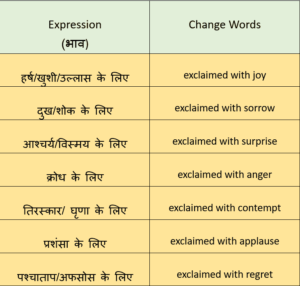आज के इस पोस्ट में Change the Narration (Part-3) में Exclamatory Sentences को Indirect Speech में किस प्रकार से Change किया जाता है, इसके बारे में विस्तारपूर्वक वर्णन किया गया है और साथ ही बहुत से Examples भी दिए गए हैं ताकि आपको समझने में आसानी हो सके। इसीलिए इस पोस्ट को ध्यान से पढ़ें और समझने का प्रयास करें।
Exclamatory Sentences(विस्मयादिबोधक वाक्य)
पहचान- ऐसे वाक्य जिनसे अचानक या तीव्र खुशी, क्रोध, दुख, आश्चर्य, घृणा, पछतावा, प्रशंसा, इत्यादि के भाव व्यक्त होते हैं, उन्हें Exclamatory Sentences कहा जाता हैं। ऐसे वाक्य अक्सर Hello!, Alas!, Hurrah!, Ah!, Oh!, Well done!, Bravo!, Ha! Ha!, Oh dear! आदि से प्रारंभ होते हैं। जैसे-
Recognition- Such sentences which express feelings of sudden or intense happiness, anger, sadness, surprise, disgust, regret, praise, etc. are called Exclamatory Sentences. Such sentences often start with Hello!, Alas!, Hurrah!, Ah!, Oh!, Well done!, Bravo!, Ha! Ha!, Oh dear! etc.
1. Wow! India won the match.
वाह! भारत मैच जीत गया।
2. Oh! Time is up.
ओह! समय समाप्त हो गया।
3. Well done! You played very well.
शाबाश! तुम बहुत अच्छा खेले।
4. For God’s sake! Speak the truth.
भगवान के लिए! सच बोलो।
 Exclamatory Sentences can be changed from Direct speech to indirect speech by following these rules:
Exclamatory Sentences can be changed from Direct speech to indirect speech by following these rules:
Rules:
1. Direct से Indirect बनाते समय ‘Reporting Verb’ (said) को ‘Reported Speech’ के अर्थ के अनुसार निम्नलिखित words में change किया जाता है:
While changing from Direct to Indirect, ‘Reporting Verb’ (said) is changed into the following words according to the meaning of ‘Reported Speech’:

2. Inverted commas के स्थान पर ‘that’ का प्रयोग किया जाता है।
‘That’ is used in place of inverted commas.
3. Exclamatory words (Ah!, Alas!, Oh my God!, Oh! etc.) को हटा दिया जाता है।
Exclamatory words (Ah!, Alas!, Oh my God!, Oh! etc.) are removed.
4. Exclamatory Sentences को Assertive Sentences में change कर दिया जाता है तथा Indirect Speech में बदलने के जो भी सामान्य नियम( pronoun, time, place & tense में बदलाव) है उन्हें apply किया जाता है।
Exclamatory Sentences are changed into Assertive Sentences and the general rules(change in pronoun, time, place & tense) for converting them into Indirect Speech are applied.
5. अंत में exclamation mark हटा कर full stop लगा दिया जाता है।
Finally, the exclamation mark is removed and a full stop is placed.
Examples-
1. Direct: The students said, “Hurrah! We are the district champions.”
Indirect: The students exclaimed with joy that they were the district champions.
2. Direct: He said, “Alas! I am undone.”
Indirect: He exclaimed sadly that he was undone.
3. Direct: He said, “Bravo! You have done well.”
Indirect: He applauded him, saying that he had done well.
4. Direct: She said, “Wow! What a beautiful flower it is.”
Indirect: She exclaimed with wonder/joy that it was a very beautiful flower.
5. Direct: She said, “Oh! I lost my purse.”
Indirect: She exclaimed with sorrow that she had lost her purse.
6. Direct: The foreigner said, “What a place it is!”
Indirect: The foreigner exclaimed with joy/surprise that it was a very beautiful place.
7. Direct: He said, “What a fool I am!”
Indirect: He exclaimed with sorrow/regret that he was a big fool.
8. Direct: She said, “How fast my baby runs!”
Indirect: She exclaimed with joy that her baby ran very fast.
9. Direct: They said, “How kind the king is!”
Indirect: They exclaimed with joy/applause that the king was very kind.
10. Direct: He said, “I can’t believe this!”
Indirect: He exclaimed with wonder/surprise that he couldn’t believe that.
11. Direct: My uncle said to me, “Well done! You have done a good job.”
Indirect: My uncle exclaimed with applause that I had done a good job.
12. Direct: Ragini said, “Sorry for being late!” (It means sorry, I am late.)
Indirect: Ragini exclaimed with regret that she was late.
13. Direct: Ruchi said, “Oh! I lost my pen.”
Indirect: Ruchi exclaimed with sorrow that she had lost her pen.
14. Direct: The doctor said, “Thank God! I needn’t go out in the rain.”
Indirect: The doctor exclaimed with relief that he didn’t need to go out in the rain.
15. Direct: He said, “Phew! We are safe now.”
Indirect: He exclaimed with relief/respite that they were safe then.
16. Direct: She said, “Fie! It is stinking.”
Indirect: She exclaimed with disgust/despise that it was stinking.
17. Direct: He said, “How fool he is!”
Indirect: He exclaimed with surprise that he was so fool.
18. Direct: The traveller said, “What a beautiful sight.”
Indirect: The traveller exclaimed with wonder that it was a beautiful sight.
19. Direct: Rohit said, “Hurrah! I have topped again.”
Indirect: Rohit exclaimed joyfully that he had topped again.
20. Direct: “Oh! How foolish I have been in terms of money matters!”
Indirect: He confessed regretfully that he had been very foolish in terms of money matters.
21. Direct: He said, “Bravo! You have done well.”
Indirect: He applauded him, saying that he had done well.
22. Direct: The man said, “Alas! My father is dead.”
Indirect: The man exclaimed with sorrow/sorrowfully that his father was dead.
23. Direct: Reena said, “Oh no! I lost my mobile.”
Indirect: Reena exclaimed with sorrow that she had lost her mobile.
24. Direct: She said, “What nonsense!”
Indirect: She exclaimed with disgust that it was too nonsense.
25. Direct: He said, “How beautifully she sings!”
Indirect: He exclaimed with praise that she sang very beautifully.
Note-जब भी exclamation दिखाने के लिए What या How का प्रयोग किया जाए तब Intensity बढ़ाने वाला word हमें अपनी तरफ से लगाना पड़ेगा। इसीलिए nonsense की Intensity बढ़ाने वाला word ‘too’ और beautifully की intensity बढ़ाने वाला word ‘very’ का प्रयोग किया गया है। Negative sense वाले words के साथ ‘too’ लगेगा जबकि Positive sense वाले words के साथ ‘very’.
26. Direct: The teacher said, “How stupid this question is!”
Indirect: The teacher exclaimed with anger that that question was very/ quite stupid.
Note- जब How या What से exclamation दिखाया जाए तब भी ‘that’ conjunction का ही use होगा, How या What का नहीं। इस sentence में ‘How’ word होने की वजह से Intensity बढ़ाने वाला word ‘very/quite’ अपनी तरफ से प्रयोग किया गया है।
27. Direct: He said, “What a beautiful city Shimla is!”
Indirect: He exclaimed with joy that Shimla is a very beautiful city.
Note- इस sentence में हम ‘is’ को ‘was’ में change नहीं करेंगे क्योंकि शिमला शहर अभी भी है और खुबसूरत है।
28. Direct: She said, “How beautiful the rain is!”
Indirect: She exclaimed with joy that the rain was very beautiful.
Note- उस बारिश की बात हो रही है जो तब हो रही थी इसलिए यहां ‘is’ को ‘was’ में change करेंगे।
Mood-based Exclamatory Sentences
1. Direct: He said, “A beggar and this attitude!”
Indirect: He exclaimed that a beggar should not have that attitude.
2. Direct: He said, “A college student in this luxury car!”
Indirect: He exclaimed that a college student is generally not seen in that luxury car.
Conclusion:
आशा करते है कि आपको ये आर्टिकल अच्छा लगा होगा और इस आर्टिकल की सहायता से आपको Change the Narration (Part-3)-How to Change Exclamatory Sentences into Indirect Speech को समझने में काफी मदद मिली होगी। अगर आपके मन में कोई सवाल हो तो आप हमें नीचे कमेंट में पूछ सकते है। इस आर्टिकल को आप अपने मित्रों के साथ सोशल मीडिया पर शेयर जरूर करें।
Read More Posts: